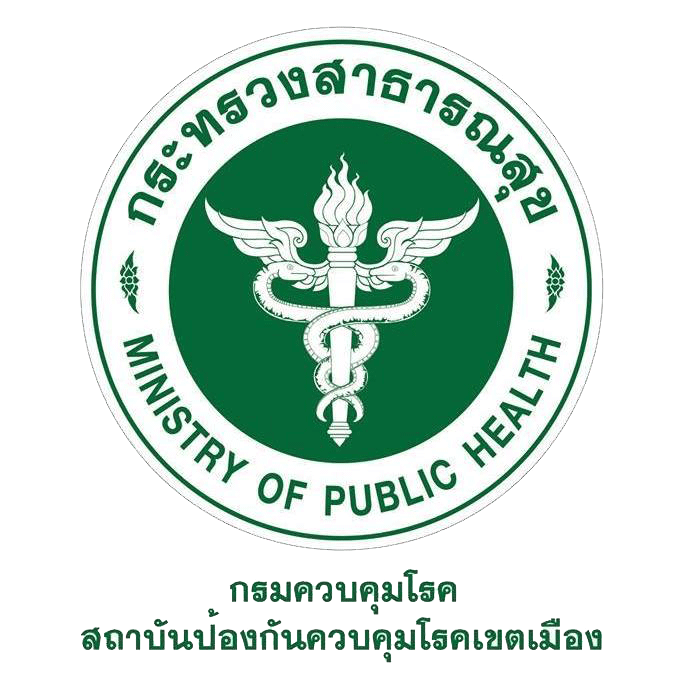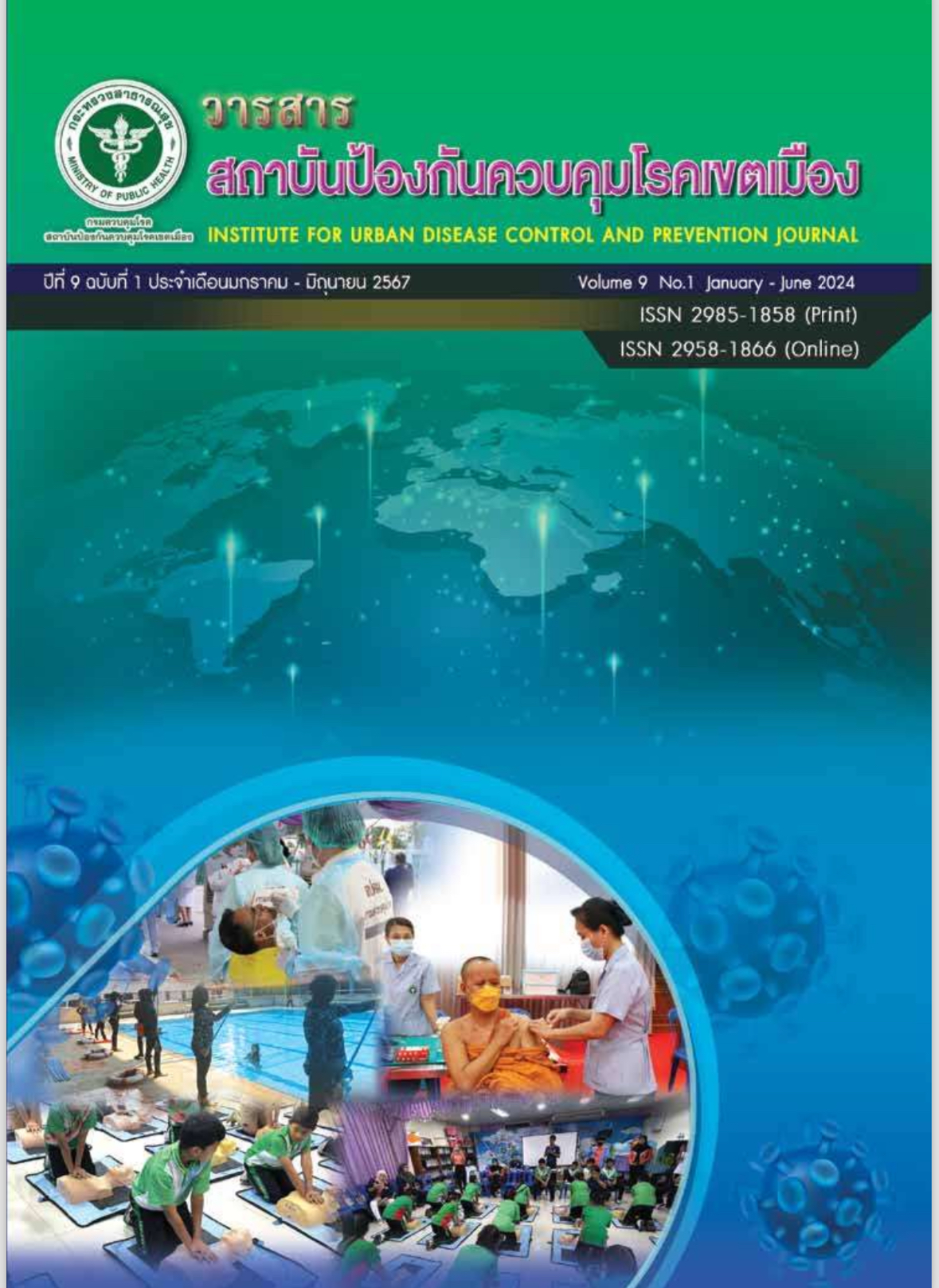ปัจจัยเสี่ยงโรคหลอดเลือดสมองในประชากรไทย
Main Article Content
บทคัดย่อ
โรคหลอดเลือดสมองถือเป็นปัญหาสุขภาพระดับโลก และการเข้าใจปัจจัยเสี่ยงต่อโรคหลอดเลือดสมองถือเป็นสิ่งสำคัญในการพัฒนาวิธีและกลไกเพื่อการป้องกันโรคได้อย่างมีประสิทธิภาพ การศึกษานี้เป็นรูปแบบเคส-คอนโทรลมีจุดประสงค์เพื่อค้นหาปัจจัยเสี่ยงต่อการเกิดโรคหลอดเลือดสมองในประชากรไทย เพื่อป้องกันโรคในระดับสาธารณสุขและทำให้สุขภาพของประชาชนไทยดีขึ้น อาสาสมัครที่เข้าร่วมโครงการเป็นผู้ป่วยโรคหลอดเลือดสมอง 957 ราย และผู้ที่ไม่เป็นโรคหลอดเลือดสมอง 997 ราย ความเสี่ยงโรคหลอดเลือดสมองในอาสาสมัครถูกคำนวณเป็นค่า adjusted odds ratios พบว่าอายุ เพศ การดื่มแอลกอฮอล์ การรับประทานอาหารที่ไม่เป็นประโยชน์ต่อร่างกาย และการขาดการออกแรงกายไม่ได้เป็นปัจจัยเสี่ยงต่อโรคหลอดเลือดสมองอย่างมีนัยสำคัญ ในทางกลับกัน อาชีพที่เกี่ยวข้องกับการเกษตรและการไม่ประกอบอาชีพ การมีประวัติคนในครอบครัวเป็นโรคหลอดเลือดสมอง ภาวะความดันโลหิตสูง และระดับคอเลสเตอรอลชนิดดี (HDL) ที่ต่ำ ถือเป็นปัจจัยเสี่ยงโรคหลอดเลือดสมอง ผลการศึกษาอาจเป็นประโยชน์ในการคาดคะเนความเสี่ยงและช่วยในการพัฒนาการประเมินความเสี่ยงโรคหลอดเลือดสมองในรูปแบบคะแนนเพื่อเพิ่มความแม่นยำในการประเมินความเสี่ยง
Article Details

อนุญาตภายใต้เงื่อนไข Creative Commons Attribution-NonCommercial-NoDerivatives 4.0 International License.
บทความที่พิมพ์ในวารสารสถาบันป้องกันควบคุมโรคเขตเมือง ถือว่าเป็นผลงานวิชาการ งานวิจัยและวิเคราะห์ ตลอดจนเป็นความเห็นส่วนตัวของผู้เขียนเอง ไม่ใช่ความเห็นของสถาบันป้องกันควบคุมโรคเขตเมือง หรือคณะบรรณาธิการแต่ประการใด ผู้เขียนจำต้องรับผิดชอบต่อบทความของตน
เอกสารอ้างอิง
World Stroke Organization (WSO). Global stroke fact sheet 2022 [Internet]. [place unknown]; 2022 [cited 2023 sept 29]. Available from: https://www.world-stroke.org/assets/downloads/WSO_Global_Stroke_Fact_Sheet.pdf
Chantkran W, Chaisakul J, Rangsin R, Mungthin M, Sakboonyarat B. Prevalence of and factors associated with stroke in hypertensive patients in Thailand from 2014 to 2018: A nationwide cross-sectional study. Scientific Reports. 2021;11(1):1-12.
Samuthpongtorn C, Jereerat T, Suwanwela NC. Stroke risk factors, subtypes and outcome in elderly Thai patients. BMC Neurology. 2021;21:1-6.
Suwanwela NC. Stroke epidemiology in Thailand. J Stroke [Internet]. 2014 Jan [cited 2023 sept 29];16(1):1-7. Available from: https://www.j-stroke.org/upload/pdf/jos-16-1.pdf
Areechokchai D, Vijitsoonthornkul K, Pongpan S, Maeakhian S. Population attributable fraction of stroke risk factors in Thailand: utilization of non-communicable disease surveillance systems. OSIR. 2017 Mar;10(1):1-6.
Hanchaiphiboolkul S, Poungvarin N, Nidhinandana S, Suwanwela NC, Puthkhao P, Towanabut S, et al. Prevalence of stroke and stroke risk factors in Thailand: Thai Epidemiologic Stroke (TES) Study. J Med Assoc Thai. 2011 Apr;94(4):427-36.
Babor TF. Higgins-Biddle JC. Saunders JB. Monteiro MG. AUDIT The Alcohol Use Disorders Identification Test [Internet]. World Health Organization; 2001 [cited 2023 sept 27]. Available from: https://iris.who.int/handle/10665/67205
Wang H, Chow SC, Li G. On sample size calculation based on odds ratio in clinical trials. J. Biopharm. Stat. 2002;12(4):471-83.
American Heart Association editorial staff. Risk factors under your control [Internet]. Dallas;2023 [cited 2023 Oct 12]. Available from: https://www.stroke.org/en/about-stroke/stroke-risk-factors/risk-factors-under-your-control
American Heart Association editorial staff. Stroke risk factors not within your control [Internet]. 2023 [cited 2023 Oct 12]. Available from: https://www.stroke.org/en/about-stroke/stroke-risk-factors/stroke-risk-factors-not-within-your-control
Stroke Association [Internet]. England: Stroke Association; [2023?]. Are you at risk of stroke? [cited 2023 Oct 12]. Available from: https://www.stroke.org.uk/what-is-stroke/are-you-at-risk-of-stroke
Yang M, Yoo H, Kim S-Y, Kwon O, Nam M-W, Pan KH, et al. Occupational Risk Factors for Stroke: A Comprehensive Review. Journal of Stroke. 2023;25(3):327-37.
Reddin C, Murphy R, Hankey GJ, Judge C, Xavier D, Rosengren A, et al. Association of Psychosocial Stress with risk of acute stroke. JAMA Network Open. 2022;5(12).
Truelsen T, Nielsen N, Boysen G, Grønbæk M. Self-reported stress and risk of stroke. Stroke. 2003;34(4):856-62.
Booth J, Connelly L, Lawrence M, Chalmers C, Joice S, Becker C, et al. Evidence of perceived psychosocial stress as a risk factor for stroke in adults: A meta-analysis. BMC Neurology. 2015;15(1).
Li H, He P, Zhang Y, Lin T, Liu C, Xie D, et al. Self-perceived psychological stress and risk of first stroke in treated hypertensive patients. Psychosomatic Medicine. 2021;84(2):237-43.
Ramírez-Moreno JM, Muñoz Vega P, Espada S, Bartolomé Alberca S, Aguirre J, Peral D. Association between self-perceived psychological stress and transitory ischaemic attack and minor stroke: A case-control study. Neurología (English Edition). 2020;35(8):556-62.
Bergh C, Udumyan R, Fall K, Nilsagård Y, Appelros P, Montgomery S. Stress resilience in male adolescents and subsequent stroke risk: Cohort study. Journal of Neurology, Neurosurgery & amp;amp; Psychiatry. 2014;85(12):1331-6.
Booth J, Connelly L, Lawrence M, Chalmers C, Joice S, Becker C, et al. Evidence of perceived psychosocial stress as a risk factor for stroke in adults: A meta-analysis. BMC Neurology. 2015;15(1).
Kotlęga D, Gołąb-Janowska M, Masztalewicz M, Ciećwież S, Nowacki P. The emotional stress and risk of ischemic stroke. Neurologia i Neurochirurgia Polska. 2016;50(4):265-70.
Lunlalad A, Apinunmahakul A. Debt Burden of Farmers’ Households as Compared to Households of Other Careers. Development Economic Review. 2022; 16(1).
Fekadu G, Chelkeba L, Kebede A. Risk factors, clinical presentations and predictors of stroke among adult patients admitted to stroke unit of Jimma university medical center, south west Ethiopia: prospective observational study. BMC Neurology. 2019;19(1).
Tian T, Jin G, Yu C, Lv J, Guo Y, Bian Z, et al. Family History and Stroke Risk in China: Evidence from a Large Cohort Study. Journal of Stroke. 2017 May 31;19(2):188-95.
Michał Błaż, Iwona Sarzyńska‐Długosz. Family history of stroke – a useful clue for the primary care physician and stroke neurologist: a narrative review. Postępy Psychiatrii i Neurologii [Internet]. 2023 Nov [cited 2023 Nov 14];32(1):31-9. Available from: https://www.ncbi.nlm.nih.gov/pmc/articles/PMC10243297/
Zhang Y, Li J, Liu C, Yu H, Chen C, Bi C, et al. High-Density Lipoprotein Cholesterol and the Risk of First Ischemic Stroke in a Chinese Hypertensive Population. Clinical Interventions in Aging. 2021 May;16:801-10.
Wannamethee SG, Shaper AG, Ebrahim S. HDL-Cholesterol, Total Cholesterol, and the Risk of Stroke in Middle-Aged British Men. Stroke. 2000 Aug;31(8):1882-8.
Sacco RL, Benson RT, Kargman DE, Boden-Albala B, Tuck C, Lin I-Feng, et al. High-Density Lipoprotein Cholesterol and Ischemic Stroke in the Elderly. JAMA. 2001 Jun 6;285(21):2729.
Sanossian N, Saver JL, Navab M, Ovbiagele B. High-Density Lipoprotein Cholesterol. Stroke. 2007 Mar;38(3):1104–9.
Reina SA, Llabre MM, Allison MA, Wilkins JT, Mendez AJ, Arnan MK, et al. HDL cholesterol and stroke risk: The Multi-Ethnic Study of Atherosclerosis. Atherosclerosis. 2015 Nov;243(1):314-9.
Thai stroke risk score [Internet]. Bangkok: Thai Health Risk. c2024. [cited 2024 Jan 13]. Available from: Thaihealthrisk.com
Thai CV risk score [Internet]. Bangkok: Mahidol University. 2015. [cited 2024 Jan 13]. Available from: https://www.rama.mahidol.ac.th/cardio_vascular_risk/thai_cv_risk_score/
American Stroke Association [Internet]. [place unknown]: American Stroke Association; c2022. Stroke Risk Assessment; 2022 [cited 2024 Jan 13]; [about 2 p.]. Available from: https://www.stroke.org/en/about-stroke/stroke-risk-factors/stroke-risk-assessment


